Contents
ToggleSummary and Conclusion
Summary
The WiT survey was concerned with the impact on the mental health and wellbeing of women who do not accept gender ideology (GI). Women were invited to speak of their feelings about, and experiences of, the international imposition of an ideology that aims to abolish sex as the determining factor for categorising men and women, to be replaced by the concept of gender identity.
The target group was female and accepted sex both as immutable and the correct criterion to be used to categorise women and men, girls and boys. Thus, the target group was women who rejected gender identity ideology.
A total of 2,943 surveys were completed.
Demographics
The ages of respondents ranged from under 18 to over 65 with 45-54 being the largest age group.
- 62.2% were heterosexual
- 18.2% were lesbian
- 16.6% were bi-sexual
- 2.6% were other
1,017 women reported living with a disability, 452 specified an existing mental health difficulty.
Over 55% of respondents reside in the UK with 16% residing in the USA. The remaining respondents reside in a range of countries from across the globe. The survey also asked about country of origin.
The summary gives a brief outline of the quantitative data as it relates to each question in the survey in turn, followed by a short summary of the responses to the open questions.
General Questions
Mental Health
Over 95% of respondents said GI had had an effect on their mental health with over 30.5 % saying it had affected their mental health a great deal. The question did not ask if the effect had been negative or positive however responses to subsequent questions made it clear that the effect had been negative.
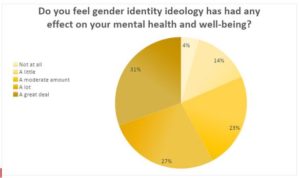
Fig. 86
9.3% of respondents have sought formal support for distress caused by GI but some said they were discriminated against in the services they accessed because of their views; some reported having had negative reactions from mental health practitioners when seeking support, others self-excluded from formal support and yet others reported having no trust in mental health services that promote GI.
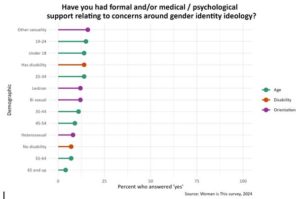
Fig. 87
Younger respondents, those with a disability and those who are lesbian, bi sexual or describe their sexuality as ‘other’, were more likely to have sought formal support for distress caused by the promotion of GI.
89% said they have sought support from informal groups of like-minded women. As the target group was contacted via such groups or by word of mouth, it is to be expected that a significant number of respondents would have answered yes to this question.
22.5% said they have increased their consumption of alcohol, food or (non)-prescription drugs to cope with GI. The survey did not ask a question about sleep but a number of women reported having difficulty sleeping. Disabled women and bi sexual and lesbian respondents reported greater increase of consumption of alcohol, food or (non)-prescription drugs. The age groups more likely to have done so were 45-54 and 35-44.
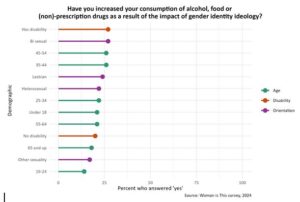
Fig. 88
59.2% of respondents said they have lost relationships with friends or/and family members. Many women who answered no to this question replied in the open question that they believe they would have lost friends or family members if they did not self-censor to avoid conflict. Disabled, lesbians and bi sexual women have been most impacted by loss of friends and family with older women being most likely to have experienced this.
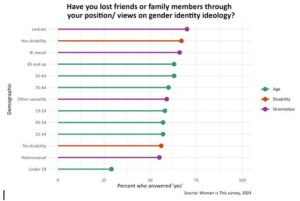
Fig. 89
Language
Over 97% of respondents said that gender should not be used where sex was meant and vice versa.
94.7% felt negative or very negative about pronouns being used in work emails, LinkedIn etc. Women chose not to apply for jobs at places where they felt they would not be able to cope with the expectation to adhere to GI demands. Some women spoke of choosing to remain in jobs where they felt safe rather than move on to a better position for fear of finding themselves with an employer that aggressively promotes GI.
98.9% of women felt negative or very negative about changes to language such as breastfeeding being replaced with chestfeeding, or uterus havers used to refer to women.
97.3% felt negative or very negative about the use of the prefix ‘cis’ before the word woman. Many stated this implied they conformed to sex role stereotypes. They also said they were being treated as a subset of their own sex with the acceptance that men could be a type of woman.
Respondents were invited to say more about the general questions. 902 women commented. Thematic coding revealed the most frequently mentioned concerns to be:
- Changes to language
- Psychological harms caused
- Family and Friends – (impact on or loss of)
- Compelled speech
- Erasure of Women
- GI in the workplace
Children and Young People
98.8% of respondents were concerned by the notion of “trans” children; 82.6% had a great deal of concern. One respondent described the idea of a “trans” child as “Ground Zero”.
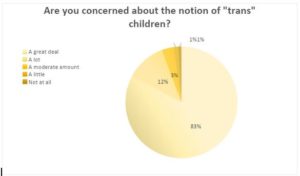
Fig. 90
98.8% were concerned about the number of children and young people “transitioning” or talking about doing so with 84.7% saying they have a great deal of concern.
Women spoke of children being confused and keen to be accepted by their peers.
85.5% of respondents were concerned about children being told that if they do not conform to sex role stereotypes, they are the opposite sex; 82.6% expressed a great deal of concern. One respondent spoke of her young female relative dressing in a more feminine way to ensure she is not seen to be invalidating the “non-binary” or “trans” identities of her friends.
98.2% of respondents were concerned about children being socially “transitioned” at school without parental knowledge; 85.5% expressed a great deal of concern.
98.9% of respondents were concerned about girls having to share facilities like toilets, changing rooms, showering areas and overnight accommodation with boys; 91.8% expressed a great deal of concern.
98.7% of respondents were concerned about children being put on puberty blockers even with parental consent; 89.4% had a great deal of concern.
98.5% of respondents were concerned about girls binding their breasts or having healthy breasts removed; 88.4% were concerned a great deal.
98.8% of women were concerned about surgery designed to “change sex” being presented as normal and glamorous to children and young people; 91.4% expressed a great deal of concern.
98.9% expressed concern about children’s wider mental health conditions being viewed solely through a gender identity lens with 90.2% expressing a great deal of concern.
98.4% of women said they were concerned that homophobia could motivate parents to seek “transition” for gay or lesbian children; 75.5% said they were concerned a great deal.
98.4% of respondents expressed concern that children see being non-binary or “trans” as being preferable to being lesbian or gay; 80.8% had a great deal of concern.
Women were invited to comment on the issues raised about children and young people. 1081 women commented. Thematic coding revealed the most frequently mentioned concerns in response to the open question on children and young people to be:
- Medicalization of children
- Sex role stereotypes being enforced
- Safeguarding of children being breached
- Role of institutions in promoting GI
- Autism and/or trauma being ignored in seeing children as being ‘trans’
- Informed consent not possible for children
- Teachers/schools role in promoting GI
Holding Gender Critical Views
A number of respondents objected to being referred to as having “gender critical views” as they reject gender altogether and are not simply critical of it. They stated that gender is a social construct that serves to maintain patriarchy. Another reason given for objecting to it is that recognising material reality should not be considered a view.
RESPONDENT COMMENT: “Radical feminists are not “gender critical”, they are gender abolitionists… and there is a massive difference.”
RESPONDENT COMMENT: “It’s astonishing to me how biology which has been around since human beings evolved is now seen as ‘gender critical’, rather than evidence based fact. It’s as though the fact that the earth is round, not flat, should be called ‘flat earth critical’.”
69% of respondents said they have been subject to verbal or physical abuse because of their views.
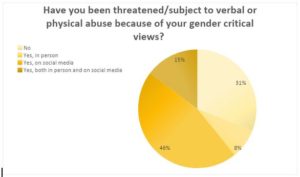
Fig. 91
77.8% of respondents have been called a TERF or other derogatory names.
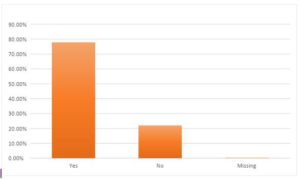
Fig. 92
94% of women self-censor; 31.4% self-censor a great deal.
88.5% of women were concerned about being called a bigot or accused of not being “inclusive”; 37.1% were concerned a great deal.
92.2% were concerned about being forced out of political organisations, community groups, and/or workplaces; 44.7% of women expressed a great deal of concern. Many women said they had already been forced out of such groups.
98.6% are concerned about women receiving death and/or rape threats for rejecting GI with 86.9% having a great deal of concern.
97.3% of respondents were concerned about marginalised women being compelled to support GI and 66.7% have a great deal of concern about this.
98.3% of women were concerned about possible legal action or police action due to false accusations of hate speech; 79.8% said they have a great deal of concern.
90.9% of women have concerns about being accused of causing emotional or physical harm if they do not affirm or if they “misgender” someone who claims to be the opposite sex. 49% have a great deal of concern about this.
Women were asked if they would like to say more about holding gender critical views.
1,038 women commented. Using thematic coding, the concerns most frequently mentioned were shown to be:
- Self-censorship
- Women being silenced
- Workplace exclusion
- Threats or abuse
- Relationships with family and friends affected
- Feeling fearful
- Political/community exclusion
- Isolation
Racism
94% of respondents were concerned about racism in the GI rhetoric with almost 50% having a great deal of concern.
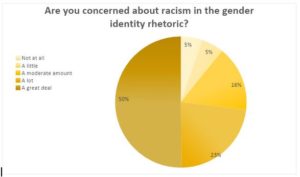
Fig. 93
A major concern for women was equating black women with men who claim to be women regarding their rightful inclusion in the category of woman and the right to use women only spaces. The frequently used trope of GI activists, “ALL women, including black women and transwomen”, was cited by respondents as racist rhetoric. This was deemed to be racist by women of all races.
Comparing women having single sex spaces to racial segregation was cited as trivialising the egregious nature of racial segregation. Women stated that in the case of men being denied access to women’s spaces, this is the oppressor being excluded from the spaces of the oppressed, whereas racial segregation was the oppressed being denied access to the spaces of the oppressor.
It is often said by GI activists that the idea of the sex binary was imposed on colonised nations by colonisers. This was deemed a lie that negated knowledge of the sex binary that colonised people had already arrived at without the need for colonisers’ input. This was seen as racist.
Cultural appropriation of categories of gender non-conforming groups within some cultures, and the subsequent misrepresentation of these to suggest a third sex (or gender) in these cultures, was also cited as racist.
When invited to comment on racism within GI, 937 women commented. Thematic coding revealed the most frequently mentioned concerns about racist rhetoric in GI to be:
- Likening Black women to “Trans” Identified males
- Accusations of gender critical racism
- Equating non-compliance with GI to racism/colonialism
- Cultural appropriation
- Transracialism
- Role of institutions in accepting racism within GI
- Accusations of white feminism
- Equating women only spaces with racial segregation
Lesbian Erasure
98.4% of women were concerned about the eradication of lesbian culture; 68.1% had a great deal of concern.
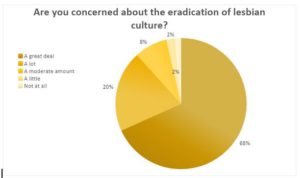
Fig. 94
99.8% of respondents were concerned about the idea that men can be lesbians with 90.1% having a great deal of concern.
99.8% were concerned about lesbians being pressurised into engaging in sexual activity with men who claim to have “lady dicks”; 88.6% had a great deal of concern.
98.7% of respondents were concerned that lesbians have to either meet in secret or welcome men as lesbians and 81.2% had a great deal of concern.
98.6% of women were concerned about lesbians being shamed if they assert same sex attraction; 84.7% had a great deal of concern.
95.6% were concerned about the lack of lesbian role models and 53.6% said they had a great deal of concern.
98.6% of women were concerned about lesbian dating sites being inundated with men who claim to be lesbians with 76.6% concerned a great deal.
98.4% expressed concern about lesbianism being redefined as same gender attraction rather than same sex attraction; 84.4% were concerned a great deal.
98.2% of women were concerned that lesbian groups prioritise men over lesbians and bisexual women; 78.6% had a great deal of concern.
98.6% of women have concerns that girls who are attracted to other girls are told they are boys, instead of being made aware of lesbianism; 85.3% had a great deal of concern.
Women who were not lesbians expressed support for lesbians and a number of women acknowledged the important role lesbians had played in the past in fighting for women’s rights.
A few respondents observed that the impact of the imposition of GI into lesbian lives and culture amounts to cultural genocide.
Asked if they would like to say more about lesbian erasure, 989 women commented. The most frequently mentioned concerns revealed by thematic coding were:
- Dangerous/violent men claiming to be lesbians
- Lesbian erasure
- Impact on young lesbians of GI and queer theory
- Loss of lesbian spaces
- Controlling/coercive behaviour to pressurise lesbians to be intimate with men
- Homophobic attitudes in GI
- Conversion/transition, “transing” the gay away
- Difficulties in dating/meeting other lesbians
- Sexually abusive men claiming to be lesbians
- Homophobia, internalised and in wider society
- Transphobic label attached to lesbians who reject intimacy with men
- Lesbian role models disappearing
Women in Professional Spaces
69% of women said GI had an impact on their working lives and 14.8% said it had impacted their working lives a great deal.
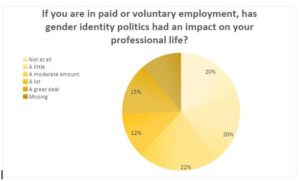
Fig. 95
Despite having GI imposed on women in the workplace, most said they were silenced if they spoke out against it. Of those for whom the question of being able to talk about their views at work applied, 76.2% said they could not talk about them and 18.4% said they could.
72.4% were concerned about the possibility of being sacked or threatened with being sacked from a job; 17.5% were concerned a great deal. 10% of women did not respond to this question, many saying in their comments that they did not work so the question did not apply to them.
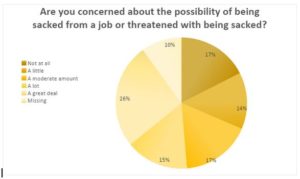
Fig. 96
Some women said they had already been sacked from their jobs for objecting to any aspect of GI which was being enforced in the workplace. Others said that they did not have the support of their unions if they were being forced to accept the ideology without their consent.
Women spoke of decreasing their fluid intake at work to avoid having to use the mixed sex toilets (mothers, aunts and grandmothers also reported that girls were doing the same at school for the same reason).
Where women said they were not concerned about being sacked from their job it was often because they were self-employed or were not dependent on their job for their income. However, some self-employed women said they risked losing customers if their views were known. Women who performed music, dance or engaged in other arts for work said they risked losing gigs or performance / exhibition space.
97.2% of respondents were concerned about women being de-platformed from speaking at events; 82.4% were concerned a great deal.
96.9% of women were concerned about funding being denied for women only services that did not include men; 82.8% were greatly concerned.
90.5% of respondents had concerns about women administering personal care to men and 55.6% were greatly concerned. A number of respondents said that this question was unclear as nurses and carers routinely administer personal care to men, so the context was important. Many women were aware of the case in Canada where a man claiming to be a woman took legal action against women for refusing to perform cosmetic waxing on his intimate bodily area. It was pointed out that this is a very different situation from a nurse carrying out personal care. Women also noted that it would be wrong for a carer being told they were caring for a woman, only to find that it was really a man who claimed to be a woman.
86% of women had concerns about having to affirm other people’s “gender identity” at work with 43.3% having a great deal of concern.
97.9% of respondents had concerns about women having academic work refused or discredited for not conforming to GI; 83.5% were greatly concerned.
98% of respondents were concerned about positions reserved for women being given to men who claim to be women; 88.7% had a great deal of concern.
98% of women were concerned about workplaces/universities/institutions (including NGOs, global organisations, political parties, cultural organisations etc.) adopting GI and 91% had a great deal of concern.
Women were invited to comment on GI in the workplace. 980 women commented. Thematic coding revealed the most frequently mentioned concerns about GI in the workplace to be:
- Employment and career progress curtailed
- Compelled speech at work
- Promoting ideology in the workplace
- Institutions such as Stonewall in the workplace
- Women silenced
- Academic work refused
- Trans identified men taking places on women’s shortlists
- Pronoun use at work
Information and Misinformation
98.7% of respondents were concerned about the use of misinformation in reports about violence against, and suicide in, the “trans community”; 80% had a great deal of concern.
Fig. 97
98.9% of respondents were concerned that crimes of violence and sexual assault by men were being reported and recorded as women’s crimes with 93% having a great deal of concern.
98.7% of women were concerned that sex-based violence cannot be evidenced since these are no longer recorded by sex; 92.3% reported a great deal of concern.
98.8% of respondents were concerned about men who identify as “trans” committing sexualised crimes against women and girls; 87% had a great deal of concern.
94.5% were concerned about assertions that women have privilege over men who claim to be women; 79% had a great deal of concern.
98.8% of women were concerned by the loss of sex-based rights and disregard for sex as a protected characteristic with 94.7% expressing a great deal of concern.
99% of women expressed concern about organisations misinforming people about the law on women’s sex-based rights and 89.4% had a great deal of concern.
98.1% of respondents were concerned about historic female figures being demonised and posthumously ‘transitioned’ and called men; 68.5% had a great deal of concern about this.
98.8% of respondents were concerned about having to refer to women’s assailants, including their rapists, as women, when giving evidence and 91.1% said they had a great deal of concern.
98.7% of respondents were concerned about GI being promoted in therapeutic, healthcare or clinical settings and 88.3% had a great deal of concern.
Women were invited to comment on information and misinformation within GI. 834 women commented. Thematic coding revealed the most frequently mentioned concerns about information and misinformation to be:
- GI impact on courts, crime and prison systems
- Data collection being inaccurate/misleading
- GI being promoted in healthcare and medical settings
- Crimes/violence by trans identified men reported and recorded as women’s crimes
- Revisionist history
- “Trans” healthcare, misinformation about the need for, and reality of, medical interventions
- Loss of language to discuss women’s issues
- Misleading information about violence purportedly caused by ‘Transphobia’
- Loss of free speech
Sexuality
97% of respondents were concerned about women being pressurised to change their sexual identity because their partner claims to be the opposite sex; 60% expressed a great deal of concern.
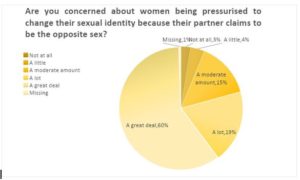
Fig. 98
Respondents were invited to comment on the impact on the sexuality of partners of “trans” identified men and women. 469 women commented. Thematic coding revealed the most frequently mentioned issues to be:
- Controlling/coercive behaviour of “transing” partner
- Trans widows
- Abusive behaviours of partner
- Need to change sexuality
- Need for support and access to it
- Misogyny as motivation
- A partner’s autogynephilia
- Divorce/separation
- Impact on children
Sex Role Stereotypes and Other Issues
80.7% of respondents were concerned by the assumption that if you do not refer to yourself as “non-binary” or “trans”, you conform to sexist stereotypes. 47.1% had a great deal of concern about this. A number of women said they were not concerned because they did not care what others assumed about them.
98% of respondents were concerned about GI enforcing rigid sex-role stereotypes. 74% said they had a great deal of concern.
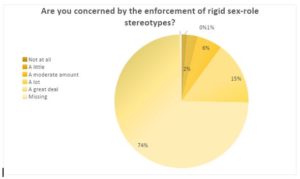
Fig. 99
98.6% of respondents were concerned by de-transitioners being stigmatised and silenced and 81.6% had a great deal of concern.
97.8% of women were concerned about therapists being afraid to attempt exploratory work with clients in case they are accused of performing conversion therapy and 80.8% said they had a great deal of concern. A significant number of women reported that they did not conform to sex role stereotypes when they were younger, with many saying they still do not, and could well envisage having it suggested to them that they were not really girls or women, had GI been around at that time. This was especially so for lesbians but by no means restricted to them.
98.7% of respondents expressed concern about having to share women only spaces (e.g. rape crisis centres, DV refuges, homeless shelters, prisons, hospital wards, psychiatric wards, changing rooms, etc.) with men; 93.5% expressed a great deal of concern.
98.3% of respondents were concerned about having to accept men providing personal care; 85.3% were very concerned. This question had particular relevance for disabled women. Respondents distinguished between being led to believe that a woman was providing personal care when it was, in fact, a man who claimed to be a woman, and being informed clearly that a man was providing the care with the option not to consent. Women said the first situation would be unacceptable to them.
98.6% of respondents had concerns about women being harmed or losing opportunities by having to compete with men in sport and 87.9% had a great deal of concern about this.
96.6% of respondents had concerns about the growing number of celebrities/influencers “identifying” as non-binary; 55.8% expressed a great deal of concern.
Respondents were invited to comment on sex role stereotypes and other issues. 721 women commented. Using thematic coding, concerns most frequently mentioned were:
- Men in women’s spaces
- Men in women’s sports
- Men providing personal care to women
- Effects of online influencers
- NGOs and governments promoting GI
- Contempt for women within the ideology
- Young people being encouraged to identify as ‘trans’
- Patriarchy as a driving factor of GI
- Self-exclusion from services and other activities
- Erasure of women through language and by other means
- Compromising child safeguarding
- Sex denialism
- Changes to language
- Impact of GI on children
- Women silenced
- Conformity to sex role stereotypes
Impact
Respondents were asked if there was anything else they wanted to say about themselves and any impact gender identity ideology has had on them. 1,088 women made additional comment on the general impact of GI. The most frequently mentioned issues on the impact were:
- Feeling degraded and dehumanised by the lack of concern for women
- Feeling excluded from women’s spaces/services
- Self-exclusion from groups and services
- Social isolation and shunned by family, friends and society
- Being silenced or self-censoring views
- Sexuality and the impact on lesbians and bisexual women
- Threats of assault, rape or death
- Physical attacks or fear of attacks
- Psychological harm such as trauma, exhaustion, loss of trust etc.
- Impact on overall health
- Impact on relationships with family and friends
- Impact on children in one’s own family
- Work and/or career progress curtailed, poor relationships with colleagues and job loss
- Partner ‘transition’ and trans widows
- (De)transitioned and impact
Conclusion
Members of the WiT collective used their own experiences of, and concerns about, gender identity ideology to compile questions in order to test whether these concerns were widespread amongst women who do not accept gender ideology. Given the levels of agreement in the responses, the conclusion must be that women in many different countries, age groups and sexualities, both disabled and not disabled, share the concerns of the members of the WiT collective.
There were differences in how women were willing or able to respond to the imposition of GI in all areas of their lives. For example, women who were retired were more freely able to speak about their concerns than women who were in employment or who had children who were captured by the ideology. Furthermore women are constrained by the laws being used or created in their countries of residence to enforce GI.
Notwithstanding these differences, women’s experience of GI and societal responses to their dissent showed remarkable similarities. Although the respondents were spread internationally, even across continents, the overwhelming agreement about the issues of concern raises the question of whether the promotion of GI is being purposely co-ordinated internationally rather than it being a result of an organic, grassroots movement. Intergovernmental organisations, global corporations, along with the global nature of the internet, appear to be fuelling an ideology that is deeply regressive despite having a mantle of being progressive.
It would appear that international lobby groups working to promote men’s sexual rights along with the global “trans healthcare” industry are wielding inordinate influence to the detriment of women.
The survey found that women who do not accept GI were well informed, had a thorough understanding of the issues and the concepts behind this ideology and how it is playing out in women’s lives. Their objections to GI were based on a real life understanding of the profound implications this ideology has for women and children. Besides speaking of the psychological, emotional, safeguarding, material, ethical and other impacts of GI on them, many women offered a political critique of the ideology.
The issues that had been identified as of concern by the women in the WiT collective were unequivocally shared by the survey respondents. This was true for women regardless of their place of residence or place of origin.
The effects of the imposition of GI on women were found to encompass every area of women’s lives. The tactic of silencing women who dissent by GI activists, along with the gagging of women within institutions, workplaces, healthcare settings, places of learning and many more, have left women distressed and isolated.
Throughout the survey women spoke of their feelings about what they identified as the erasure of women and the persecution they experienced when they attempted to resist this erasure. Women spoke of far reaching damage to their family lives and relationships, their exclusion from wider society including political organisations, social activities, sports, education, employment and of the loss of language and accurate data about women along with the implications of GI being promoted in healthcare settings. Many women spoke of feeling both excluded and estranged from society. They also spoke of the loss of lesbian culture, of lesbians being shamed into being intimate with men and the loss of the right for women to define their own sexuality.
The impact on the safeguarding of children was a serious concern and many women felt fearful for their own children or devastated by actual harms that had already befallen their children. Women also spoke of the loss of safeguarding for themselves and other women. Older women spoke of their life’s work of challenging gender as a vehicle for the oppression of women now being undone with the promotion, once again, of sex role stereotypes. However many also spoke of determination to fight to regain the ground women have lost by what many women see as a process of colonisation of womanhood by men. There was also acknowledgment of a supportive community of dissenting women that has emerged.
The survey provides more than ample evidence that women’s ability to flourish in the world is being thwarted in virtually every area of life by gender ideology. Some women described their lives as having been destroyed and of being prevented from speaking about it.
The international imposition of gender identity ideology on women is a social, legal and cultural shift of enormous proportions. That this has been carried out by stealth, through the use of misinformation, obfuscation, bullying and threats of, and actual, income loss is of major concern. Women have spent much time trying to understand why this attack on women and children is being supported as it is. It is recognised by many women as a men’s sexual rights movement and a process of priming the population for the exploitation of the human body, in particular human sexuality and human reproduction, for profit (see the work of Jennifer Bilek, 11th Hour Blog: https://www.the11thhourblog.com/)
Radical feminists had identified sex role stereotypes, i.e. gender, as a hierarchical system which has enabled the oppression of women. The embedding of gender into laws and culture is set to prevent women from fighting their oppression as a sex class since sex is being replaced with gender identity. As such, gender ideology has the ability to foil future feminist analyses of patriarchy and further campaigning for change. GI is therefore both anti-woman and anti-feminist.
The WiT survey reveals that women who are resisting this re-categorisation of women are being subjected to widespread persecution.
Mental Health and Mental Wellbeing:
The survey was interested in the mental health and mental wellbeing effects of GI on women, but the responses in the comments go further and offer a full rationale for the reasons why women feel psychologically and morally harmed. One reason concerns what respondents see as attacks on women’s self-respect, such as being forced, humiliatingly, to enact a public display of collusion with an ideology that they understand to hold women in contempt. One woman described having the same reaction to the LGBTQI+ flag being displayed in places of work as she had in the past to the once ubiquitous porn calendars and pinups hanging on workplace walls.
Being compelled to participate in an ideology that degrades and harms the compelled individual constitutes a moral injury.
RESPONDENT COMMENT: “Invasion, occupation, colonisation and assimilation. This is nakedly a neo-colonial movement, and a thoroughly unashamed and unapologetic one at that.”
RESPONDENT COMMENT: “I think about it almost all the time as I have been a feminist from my earliest memory and it is fundamental to my beliefs, values and existence”.
Turning again to how the UK charity, Mind, defines the features of mental wellbeing, it is clear that these features of women’s wellbeing are undermined by an extreme anti-woman ideology. Women’s self-acceptance is being tried by the redefinition of self that is being foisted onto them, their accurate perception of reality is being called into question by what is popularly referred to as gaslighting, as women are told that reality is subjective and they must defer to the subjective ‘reality’ of men who are breaching their hard fought for boundaries.
Where women may well have interests, they are being prevented from pursuing these due to being excluded or self excluding. It must also be noted that women are spending an inordinate amount of time thinking about GI and taking action to hold onto their sex based rights. Women are forced to lie about reality and instead pay tribute to untruths that debase women, if they refuse to do so, they are subject to punishment for remaining true to their values. Women have spoken of loss of, or damage to, relationships with family and friends. Although some women spoke of a sense of hopelessness, they also spoke of determination to act to improve the situation for themselves and other women.
Turning to the World Health Organisation’s “Concepts in mental health … Mental health is a state of mental well-being that enables people to cope with the stresses of life, realize their abilities, learn well and work well, and contribute to their community. It is an integral component of health and well-being that underpins our individual and collective abilities to make decisions, build relationships and shape the world we live in. Mental health is a basic human right. And it is crucial to personal, community and socio-economic development.”
It is clear that gender ideology is a deeply destabilising force in women’s lives. Women have spoken clearly of, “mental states associated with significant distress, impairment in functioning, or risk of self-harm.”
The World Health Organisation recognises the determinants of mental health to include: “Exposure to unfavourable social, economic, geopolitical and environmental circumstances – including poverty, violence, inequality and environmental deprivation – also increases people’s risk of experiencing mental health conditions.”
This report concludes that due to the promotion of gender ideology in many countries, together with the aggressive enforcement of the ideology, women in these countries are being isolated, intimidated and diminished in all areas of life. Beyond that, women’s sense of self, of their own safety and their ability to keep their children safe, are under attack.
For many women, the reality of living under GI has created social conditions that amount to a hostile environment that permeates all areas of their lives. The accounts of their experience of GI by the respondents to the survey reveal this enforced ideology to be a catastrophe for women and girls.
The World Health Organisation describes good mental health as being a human right, but this human right is only one of the many rights being denied women in the name of gender identity ideology.
